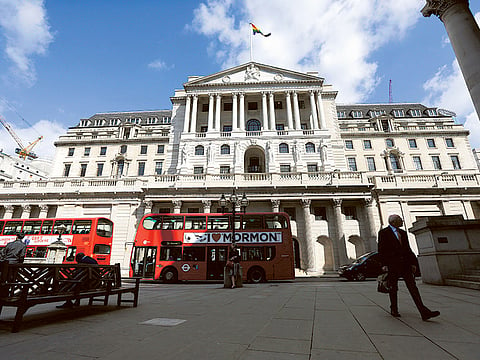Carney signals stronger BoE forecasts as Brexit risks recede
Economic strength has emboldened BoE’s Mark Carney’s critics after the BOE predicted a sharp slowdown from Brexit last year

London: The Bank of England may be about to raise its economic outlook for the second time since the Brexit vote, reflecting a resilience that’s seen Mark Carney criticised for over-egging the threats from the decision to leave the European Union.
As the BoE prepares to publish to new forecasts in three weeks, its first in 2017, the governor said recent data is “consistent with some further upgrade.” The Monetary Policy Committee lifted its projections in November after slashing the outlook three months earlier.
“This is about the near term strength of the economy, which is absolutely welcome,” Carney told lawmakers in London on Wednesday.
That economic strength has emboldened Carney’s critics after the BoE predicted a sharp slowdown from Brexit last year. The governor said it’s is no longer the biggest risk to financial stability — partly thanks to the bank’s steps — though the exit process from the EU has the potential to amplify certain weak spots in the economy. UK Prime Minister Theresa May says she’ll trigger the process for formal talks by the end of March.
The BoE currently expects growth of 1.4 per cent this year, down from 2.2 per cent in 2016, and Carney said that Brexit will probably still drag on the expansion. After the last forecasts were issued in November, policymakers said the next interest-rate change could be up or down.
But with the downturn now looking much less sharp, and the pound’s depreciation pushing up inflation, many economists say that means the next move — when it comes — could be a hike. Consumer-price growth is forecast to breach the BoE’s 2 per cent target next quarter, and Carney said the UK is already seeing a “notable” ‘ pickup.
Rate odds
Traders see the probability of a rate increase by the end of 2017 at 25 per cent, up from 20 per cent at the start of the year. Investors are pricing in zero chance of a loosening.
“The data has been incredibly strong,” said Liz Martins, an economist at HSBC Holdings Plc. “Also we’ve had a bit of a global upswing as well, which is supporting the UK”
BOE staff start drawing up the quarterly forecasts weeks before policymakers publish the Inflation Report, with the next one due on February 2. The MPC will start meetings later this month to make the interest-rate decision that will be announced on the same day.
Carney on Wednesday gave a signal of another potential response to the stronger outlook, saying there “will be a case” for the Financial Policy Committee to raise the countercyclical capital buffer applied to lenders for UK exposures if the economy continues to perform as it has in recent months.
Brexit analysis
Carney said the risk analysis around Brexit was right at the time — policymakers pledged to provide an additional £250 billion (Dh1.1 trillion, $306 billion) to the financial system the morning after the vote. The BoE’s success in preventing major disruptions is “perversely” leading people to say the bank’s concerns were misplaced.
“In the run up to the referendum, we felt it was the largest risk because here were a series of positions and possibilities in the financial sector — things that could have happened — that would have had financial stability consequences,” he said. “Having got through the night and the day after, the scale of the immediate risks around Brexit have gone down for the UK”
During the hearing at Parliament’s Treasury Committee, the governor also sought to distance himself from comments by BoE Chief Economist Andy Haldane, who said last week that it was a “fair cop” to say that the bank- in common with almost all mainstream forecasters — was wrong to expect a sharper slowdown after the referendum.
Greater failure
“One of the advantages of banishing group think is that one doesn’t always agree with everything that’s said by colleagues,” Carney said. He added that while the bank’s forecasts for the pace of growth since the Brexit vote weren’t perfect, economists’ failure to anticipate the financial crisis was a much greater failure.
The BoE’s record is set to stay in focus this year with lawmakers reviewing the effectiveness of its aggressive policy loosening after politicians including the prime minister questioned its adverse side effects. The BoE’s governing body is already concerned about the institution’s reputation after accusations in 2016 that it was too partisan before the Brexit vote.



